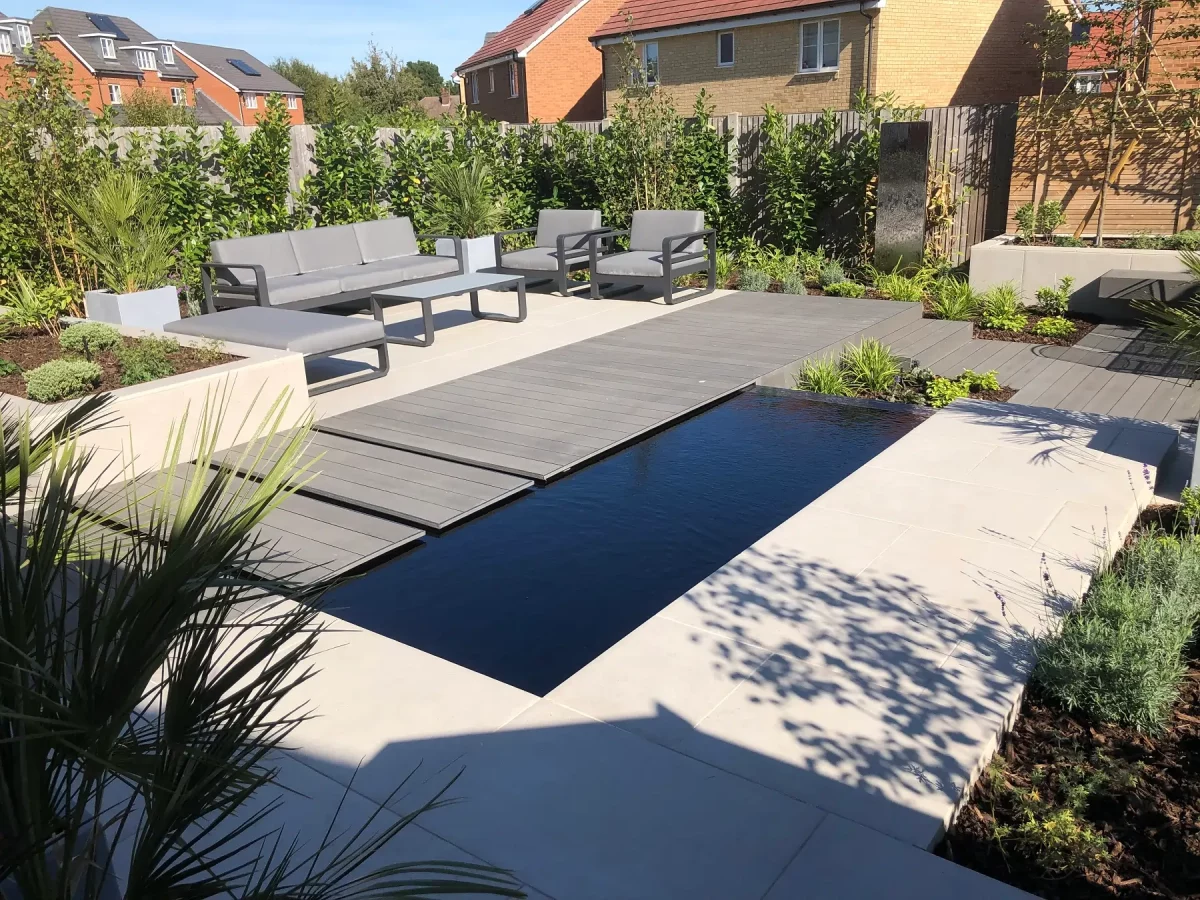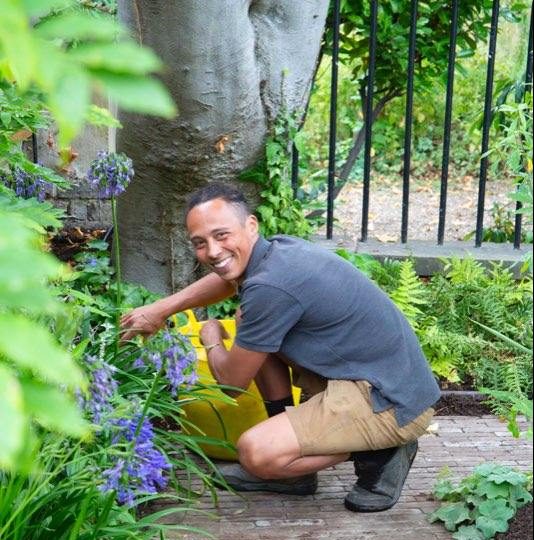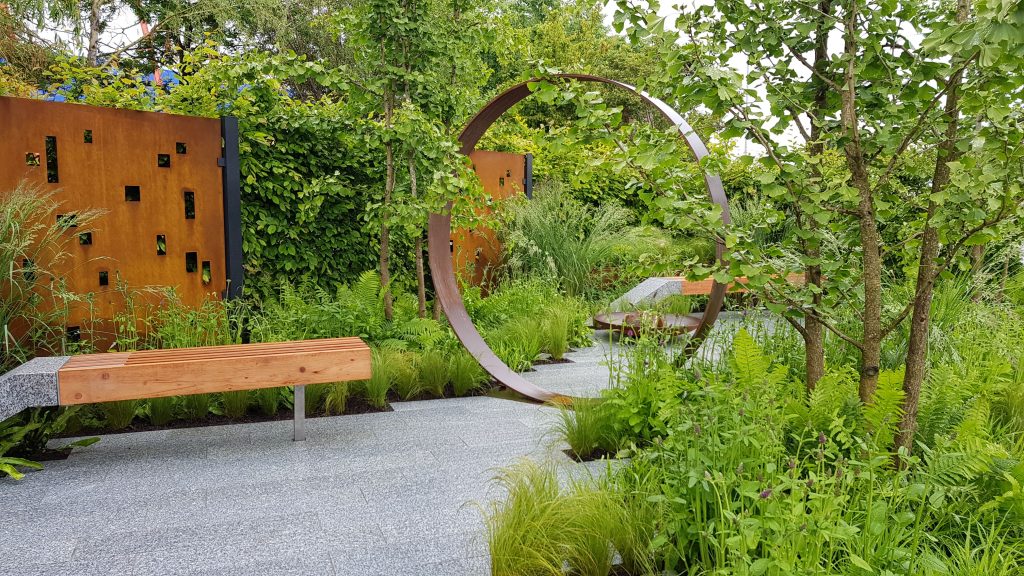Wondering how to look after your newly designed garden? Expert Claire Vokins explains why you need a professional gardener.
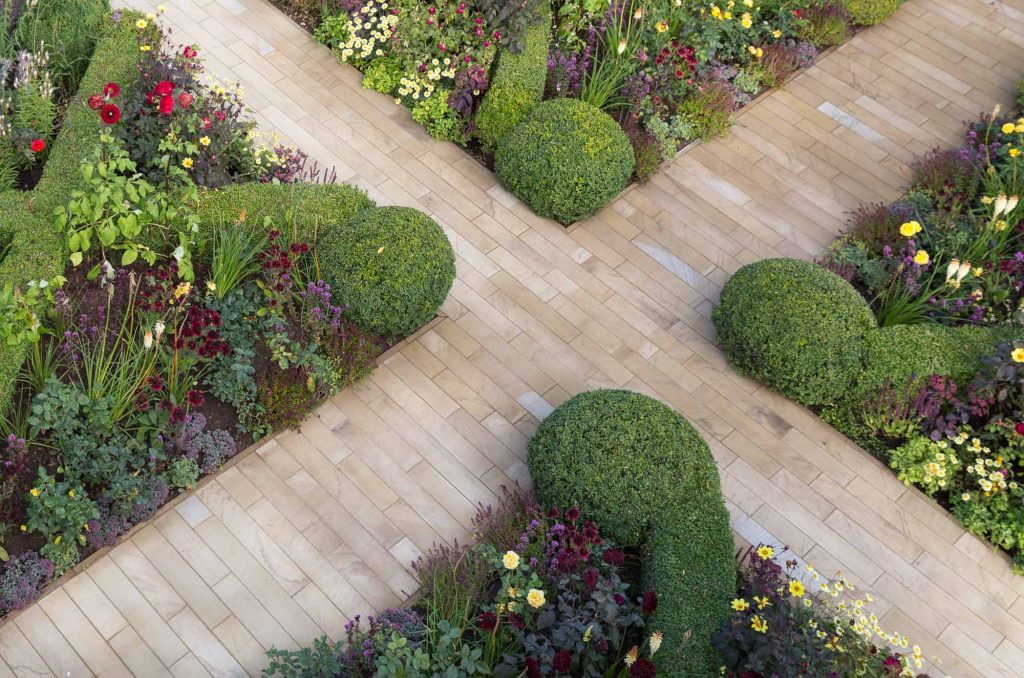
Do I need a gardener?
In the joyful period after the completion of your new garden, how you’ll keep it looking good can be overlooked. In order for a garden project to thrive and become the living, breathing reality that was once dreamt about, it will need to be looked after.
Ongoing maintenance is too often an under-rated service, but it will mean you continue to love your outdoor space in the years ahead, and could save you money in the long run.
The Car Analogy
When purchasing a car, you probably took a lot of time deciding on specifications. You chose a manufacturer, colours, engine size, weighed up the environmental and financial implications and paid your money.
Over time you add fuel, water and change the oil. You clean it, and at regular intervals you have it serviced by a qualified professional.
Mirroring the way you chose your car, when you decided to have your outdoor space redesigned you probably took a lot of time choosing the designer, the landscaper, the hard-landscaping materials and soft landscaping to finish the project. You chose colours, stone or porcelain, wood, trees, shrubs and plants. Hopefully you weighed up the environmental and financial implications of your choices, and paid your money.
The maintenance your garden needs
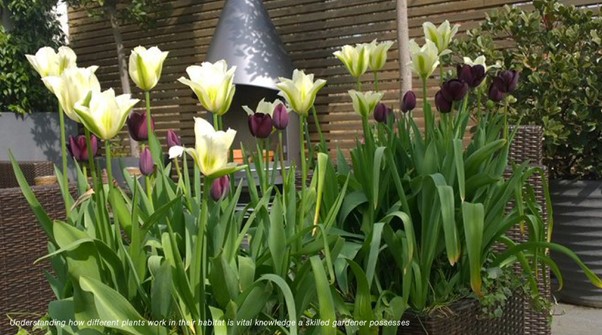
I expect you spent as much, if not more, on your garden project than on your car. After the initial blissful period, which will likely last 6-8 weeks, you’ll begin to realise that your garden requires work to ensure it keeps its good looks.
In time you will need to feed your garden and add water—regularly. You will need to clean the hard-landscaping areas and, at regular intervals determined by the plants, you will need to deadhead, cut back and prune, as well as perform many other tasks as and when required.
Unless you have the time, inclination and knowledge, the chances are you feel slightly overwhelmed with the amount of work that needs to be done. You’re not alone in feeling this.
Why do I need a trained gardener?
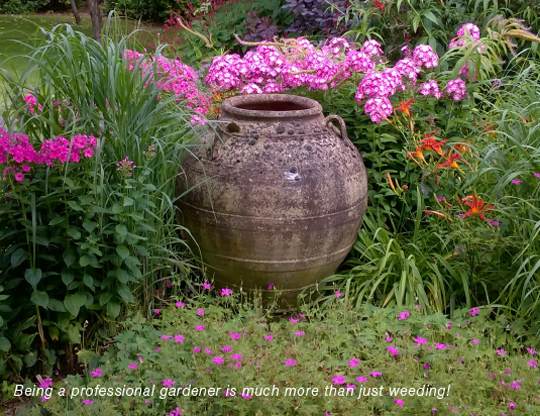
Securing a professional gardener can be beneficial in many ways. There is no ‘one size fits all’ solution. You can hire someone to take on all the work or just for specific tasks.
At an early stage during the design process, the client’s realistic involvement in the development and care of the garden should be established. Hopefully this will include discussion of plant selection, future financial implications and/or recruitment of a trained gardener to assist. No-one wants the garden to become out of control and hard work. Creating a garden should be an enjoyable, and often rewarding, experience.
How do I find a professional gardener?
There are numerous avenues to secure the services of a gardener (and many aren't professional), from searching on the internet to word-of-mouth recommendations.
If you are serious about establishing a working relationship with a professional gardener, the following list are the best places to look:
- The PGG (Professional Gardeners Guild)
- The PGT (Professional Gardeners Trust)
- The PGCA (Professional Gardeners Consultants Association)
- The CIoH (Chartered Institute of Horticulture)
If your gardener is a member of any of these associations, it demonstrates that they have provided information to the group that confirms qualifications and experience. (And if you are a professional gardener, then find out more about London Stone's Landscape Specialist Scheme.)
If the above seems a bit daunting, then I’ve compiled a list below that should help you choose who is best to care for your garden.
What should I look for when choosing my gardener?
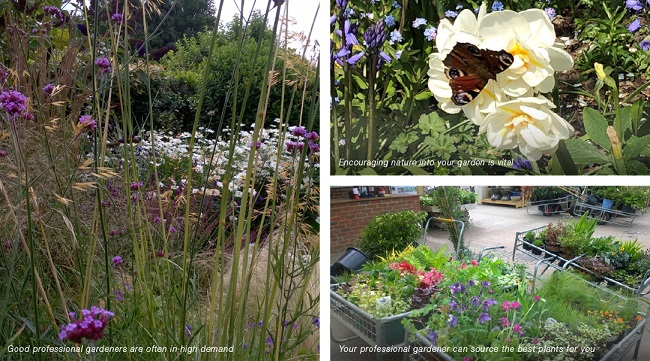
Here’s a good list:
- Insurance: You wouldn’t allow other service providers into your home without insurance, so apply the same rule to your garden. A professional gardener should have Public Liability Insurance, Employee Insurance if they employ other people, and, in some instances, Professional Indemnity (this rule applies to the designer and landscaper too).
- Qualifications: Horticultural qualifications include City & Guilds, NVQs, RHS qualifications, degrees in various plant-based, design-based subjects. The list is long!
- Experience: Gauge this by speaking to your prospective gardener. They may have previously worked for public gardens and not domestic gardens. Ask them what sort of work they have done before, which area and size of garden, to see if they suit your garden’s requirements. Enquire about CPD (Continual Professional Development). Things can change quickly in horticulture and keeping on top of those changes is part of a gardener’s role. From plant names, to possible pest and disease issues, through to legislation of chemical control, we should all be up to date. Don’t be afraid to ask for references.
- Tools: Your gardener should provide all the tools they need for the job. They shouldn’t be using yours. This could be an insurance issue should something go wrong.
- Costs: The cost of hiring a gardener varies across the country. Like with most services, cities such as London and areas such as the South East of England are likely to be more expensive than elsewhere. But do remember, an hourly rate that a gardener charges has to include all of their business costs (PAYE, insurance, vehicles, fuel, tools, business rates, training and CPD). As with most services, if a deal looks too good to be true, it usually is.
- Communication: You will hopefully have a long and mutually beneficial relationship with your gardener, so you need to get along. Your gardener will have an idea of what needs to be done over the course of a year. You will have an idea of what you require. This needs to be communicated so you both manage expectations.
Hanging onto a good gardener!
The skills and knowledge of a gardener with experience and training can make a huge difference to the appearance of your outdoor space and can greatly enhance your enjoyment.
Once you have your gardener, you will want to keep them. If your client-gardener relationship is working, then they’ll likely be in demand. We are a hardy bunch, but being paid on time, having access to a toilet, and being offered a hot drink every now and then goes a long way to keeping us happy!
About Claire Vokins

Claire became a professional gardener after changing careers from a project management role in the public sector. She owns Elizabeth Clare Gardening Ltd and is a passionate advocate of professional gardeners, and is on a mission to ensure that they are properly recognised by industry associations across the horticulture sector.
Looking for a professional gardener?
Enter your postcode on our Connect page, to find garden maintenance services near you.


/filters:quality(60)/mediadev/media/menu-pics/all-porcelain.jpg )
/filters:quality(60)/mediadev/media/menu-pics/luxury-italian.jpg )
/filters:quality(60)/mediadev/media/menu-pics/premium-italian.jpg )
/filters:quality(60)/mediadev/media/menu-pics/budget-porcelain.jpg )
/filters:quality(60)/mediadev/media/menu-pics/large-format-porcelain.jpg )
/filters:quality(60)/mediadev/media/menu-pics/wood-effect-porcelain.jpg )
/filters:quality(60)/mediadev/media/menu-pics/porcelain-planks.jpg )
/filters:quality(60)/mediadev/media/menu-pics/porcelain-setts.jpg )
/filters:quality(60)/mediadev/media/menu-pics/browse-all-paving.jpg )
/filters:quality(60)/mediadev/media/menu-pics/stone-paving.jpg )
/filters:quality(60)/mediadev/media/menu-pics/interior-tiles.jpg )
/filters:quality(60)/mediadev/media/menu-pics/stone-effect-porcelain.png )
/filters:quality(60)/mediadev/media/menu-pics/wood-effect-porcelain.png )
/filters:quality(60)/mediadev/media/menu-pics/grey-porcelain.png )
/filters:quality(60)/mediadev/media/menu-pics/beige-porcelain.png )
/filters:quality(60)/mediadev/media/menu-pics/dark-porcelain.png )
/filters:quality(60)/mediadev/media/menu-pics/light-porcelain.png )
/filters:quality(60)/mediadev/media/menu-pics/patio-grout.jpg)
/filters:quality(60)/mediadev/media/menu-pics/primers.jpg)
/filters:quality(60)/mediadev/media/menu-pics/porcelain-blades.jpg)
/filters:quality(90)/mediadev/media/menu-pics/drainage.jpg)
/filters:quality(60)/mediadev/media/menu-pics/cleaners.jpg)
/filters:quality(60)/mediadev/media/menu-pics/all-stone-paving.jpg )
/filters:quality(60)/mediadev/media/menu-pics/all-sawn-paving.jpg )
/filters:quality(60)/mediadev/media/menu-pics/all-riven-paving.jpg )
/filters:quality(60)/mediadev/media/menu-pics/indian-sandstone.jpg )
/filters:quality(60)/mediadev/media/menu-pics/limestone-paving.jpg )
/filters:quality(60)/mediadev/media/menu-pics/granite-paving.jpg )
/filters:quality(60)/mediadev/media/menu-pics/slate-paving.jpg )
/filters:quality(60)/mediadev/media/menu-pics/yorkstone-paving.jpg )
/filters:quality(60)/mediadev/media/menu-pics/stone-pavers.jpg )
/filters:quality(60)/mediadev/media/menu-pics/cobbles-setts.jpg )
/filters:quality(60)/mediadev/media/menu-pics/plank-paving.jpg )
/filters:quality(60)/mediadev/media/menu-pics/paving-circles.jpg )
/filters:quality(60)/mediadev/media/menu-pics/bespoke-paving-1.jpg )
/filters:quality(60)/mediadev/media/menu-pics/edging-stones-1.jpg )
/filters:quality(60)/mediadev/media/menu-pics/prestige-stone.jpg )
/filters:quality(60)/mediadev/media/menu-pics/grey-blue-stone.png)
/filters:quality(60)/mediadev/media/menu-pics/swatch-black-dark.jpg )
/filters:quality(60)/mediadev/media/menu-pics/swatch-buff-beige-white.jpg )
/filters:quality(60)/mediadev/media/menu-pics/sealants.jpg)
/filters:quality(60)/mediadev/media/menu-pics/all-clay-paving.jpg )
/filters:quality(60)/mediadev/media/menu-pics/alpha-clay-pavers.jpg )
/filters:quality(60)/mediadev/media/menu-pics/cottage-garden-clay-pavers.jpg )
/filters:quality(60)/mediadev/media/menu-pics/kessel-garden-clay-pavers.jpg )
/filters:quality(60)/mediadev/media/menu-pics/artisan-clay-pavers.jpg )
/filters:quality(60)/mediadev/media/menu-pics/grey-blue-clay-paver.png )
/filters:quality(60)/mediadev/media/menu-pics/red-brown-clay-pavers.png )
/filters:quality(60)/mediadev/media/menu-pics/beige-buff-clay-pavers.png )
/filters:quality(60)/mediadev/media/menu-pics/composite-decking.jpg )
/filters:quality(60)/mediadev/media/menu-pics/designboard-decking.jpg )
/filters:quality(60)/mediadev/media/menu-pics/classic-designboard.jpg )
/filters:quality(60)/mediadev/media/menu-pics/brushed-designboard.jpg )
/filters:quality(60)/mediadev/media/menu-pics/grooved-designboard.jpg )
/filters:quality(60)/mediadev/media/menu-pics/millboard-decking.jpg )
/filters:quality(60)/mediadev/media/menu-pics/grey-decking.jpg )
/filters:quality(60)/mediadev/media/menu-pics/black-charcoal-decking.jpg)
/filters:quality(60)/mediadev/media/menu-pics/brown-decking.jpg)
/filters:quality(60)/mediadev/media/menu-pics/all-build-deck.png )
/filters:quality(60)/mediadev/media/menu-pics/stone-cladding.jpg )
/filters:quality(60)/mediadev/media/menu-pics/all-garden-walling-1.jpg )
/filters:quality(60)/mediadev/media/menu-pics/facing-bricks.jpg )
/filters:quality(60)/mediadev/media/menu-pics/garden-screening.jpg )
/filters:quality(60)/mediadev/media/menu-pics/all-steps-coping.jpg )
/filters:quality(60)/mediadev/media/menu-pics/stone-garden-steps.jpg )
/filters:quality(60)/mediadev/media/menu-pics/sawn-steps.jpg )
/filters:quality(60)/mediadev/media/menu-pics/riven-steps.jpg )
/filters:quality(60)/mediadev/media/menu-pics/yorkstone-steps.jpg )
/filters:quality(60)/mediadev/media/menu-pics/bespoke-steps.jpg )
/filters:quality(60)/mediadev/media/menu-pics/porcelain-steps.jpg )
/filters:quality(60)/mediadev/media/menu-pics/off-the-shelf.jpg )
/filters:quality(60)/mediadev/media/menu-pics/stone-coping.jpg )
/filters:quality(60)/mediadev/media/menu-pics/sawn-coping.jpg )
/filters:quality(60)/mediadev/media/menu-pics/riven-coping.jpg )
/filters:quality(60)/mediadev/media/menu-pics/yorkstone-coping.jpg )
/filters:quality(60)/mediadev/media/menu-pics/bespoke-coping.jpg )
/filters:quality(60)/mediadev/media/menu-pics/stone-pier-caps.jpg )
/filters:quality(60)/mediadev/media/menu-pics/porcelain-coping.jpg )
/filters:quality(60)/mediadev/media/menu-pics/all-bespoke-services.jpg )
/filters:quality(60)/mediadev/media/menu-pics/bespoke-paving-2.jpg )
/filters:quality(60)/mediadev/media/menu-pics/bespoke-steps-1.jpg )
/filters:quality(60)/mediadev/media/menu-pics/bespoke-coping-1.jpg )
/filters:quality(60)/mediadev/media/menu-pics/edge-profiles.jpg )
/filters:quality(60)/mediadev/media/menu-pics/masonry-services.jpg )
/filters:quality(60)/mediadev/media/menu-pics/deluxe-pergolas.jpg )
/filters:quality(60)/mediadev/media/menu-pics/proteus-pergolas.jpg )


